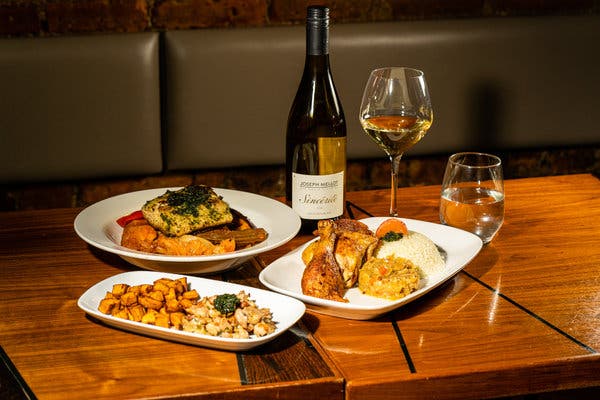On one plate lie cuts of steak, black-edged and blushing, alongside potatoes dauphinoise, and on another, crimson-stained rice suffused with the deep, thrilling funk of guedj, fermented dried fish, and yete, sea snails buried in sand and then dried in the sun, tasting of brine, smoke and musk.
Each meal at Le Succulent, a modest bistro in Park Slope, Brooklyn, unites West Africa and France. Melanie Delcourt, the chef, grew up in Douala, Cameroon, and studied law in Paris before attending the acclaimed cooking school Le Cordon Bleu and pursuing a career in high-end kitchens.
Five years ago, on a trip to the United States, she fell in love with the crush and bustle of New York. “These silly people don’t go to sleep,” she said. “They’re crazy. I like that. I am crazy too.”
She and her husband, Xavier Delcourt, tried to open a restaurant in Harlem in 2016, but the deal fell through. Brooklyn beckoned, and late last December — “a bad time; where were all the people?” Ms. Delcourt said ruefully, not having anticipated a holiday exodus — they unveiled Le Succulent.
The food here is steeped in comfort, but there is a meticulousness to the cooking, an elegance in its contours, all the better for not calling attention to itself.

For accras de morue, salt cod fritters, Ms. Delcourt soaks and rinses the cod until half the salt has leached out, then mashes it with parsley, garlic, shallots (“many”), ginger (“sometimes”) and spices imported from Cameroon. She stows the mixture in the refrigerator overnight, to blend and bind, and fries it to order.
It’s not exactly as she made it in Paris: She had to adjust the recipe because American flour proved so different in texture. After running multiple tests, she struck on the right calibrations, resulting in craggy puffs of dark bronze that shatter and vanish, richness yielding to lightness, leaving not a trace of oil on the fingers.
What she cooks is not fusion, but rather a give and take, two culinary traditions living companionably side by side. Often, West Africa and France simply share the table: here a delicate salad of shaved fennel, there a tumble of fried ripe plantains, given a kiss of salt to smooth out the sweetness.
But at times, flavors and techniques meet in a single dish. Rather than braise chicken for Senegalese yassa, Ms. Delcourt makes a classic poulet rôti, the chicken roasted and basted in its own juices, and presents it with the yassa onions — more onions than you could ever imagine, cooked down into one, bright and sharp with lemon, white wine vinegar and enough Dijon mustard and habanero to clear your head and make you sit upright.
Ms. Delcourt might rub the chicken with ginger, or toss a fresh apple in the roasting pan, depending on her mood. “I am always thinking, what can I do to make my customers fall down” — to make them swoon, she said.
For thiebou djeun, another Senegalese specialty, she boils cassava, cabbage, eggplant and sweet potato with guedj, yete and a whole fish, bones included, then reserves the stock to cook the rice. A separate fish fillet is served on top, pan-seared — French in style, save for a brushing of rof, parsley and garlic pounded into a paste spiked with habaneros.
(The chiles are used judiciously, more for flavor than heat. The one exception is the hot sauce that accompanies the accras de morue, which I kept secretly returning to long after everyone else had moved on to the main courses.)
The dining room is narrow but feels more spacious than it is, with a handful of bentwood chairs and tables along a pale banquette. Low candles and muted lights reflect off mirrors in gilt frames, bearing loopy-lettered phrases: “Merci beaucoup” and “See you soon!”
Only a small number of desserts are prepared each day, and if you dine too late, you may be out of luck. I still mourn my missed chance to try Ms. Delcourt’s snow egg, poached meringue adrift in crème anglaise.





